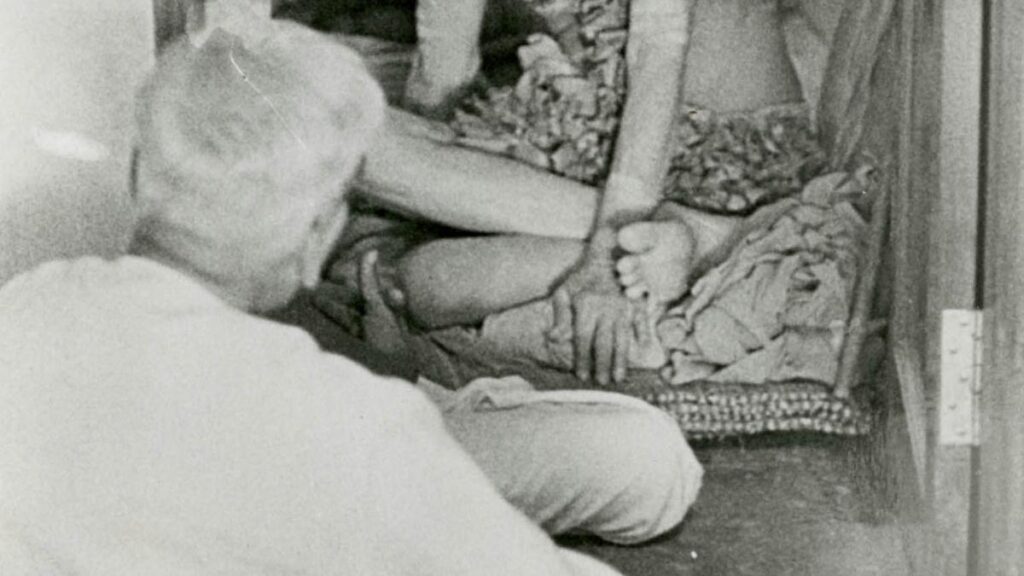
Personal visit: President R. Venkataraman with Sri Chandrasekarendra Saraswathi of the Kanchi Kamakoti Peetam on June 28, 1990.
| Photo Credit: THE HINDU ARCHIVES
When a President makes a personal religious visit, can the expenditure thus incurred be recovered from those holding the high constitutional office? In the early 1990s, the Madras High Court had to decide on the merits of such a plea. President R. Venkataraman (1987-1992) made personal visits to the Kanchi Math. In September 1992, after Venkataraman’s tenure at the Rashtrapati Bhavan ended, M. Palanibaba moved the court for a direction to the Union of India to recover the expenditure incurred by the former President for his personal visits to the Math.
The petitioner said Venkataraman did not enjoy any special privilege and he was like any other citizen. As the Head of Executive, he could travel throughout India for any “official purpose”, but there was no provision anywhere in the Constitution or in any other law enabling him to utilise any transport of the government for his “personal visits”, unless he paid for it from his own pocket. Palanibaba alleged that from the date of assuming office, Venkataraman used to visit the Kancheepuram Math, “flying from New Delhi to Madras by a special flight and from Madras to Kancheepuram, he took three helicopters at the expense of the Government”. The government, according to him, was not bound to provide the President with any transport for those visits.
Proper affidavit sought
When the matter was posted for admission, the judge sought a proper affidavit. Subsequently, Palanibaba submitted in an affidavit that he had no grievance about the devotion of the second respondent (Venkataraman) towards any one of the three Sankaracharyas of the Kancheepuram Math in his individual capacity, but he had burdened the exchequer of the State considerably by making frequent visits to Kancheepuram by using the office of President and privileges attached thereto. Therefore, the court had a constitutional duty under Article 226 to direct Venkataraman to refund all expenses as “the Constitution is secular in character”.
The judge noted that the second affidavit was also vague. It did not provide details of expenses allegedly incurred towards the visits. In spite of several opportunities, his counsel did not bring to the notice of the court the relevant provisions in law regarding the privileges which could be enjoyed by the President.
Extensively citing the debate in the Constituent Assembly on the salary and allowances payable to the President, the court said the Constituent Assembly had thought it fit to leave the question of emoluments to Parliament. Until any law was made by Parliament, the emoluments and allowances should be the same as enjoyed by the Governor-General of India immediately before the Constitution came into force. “It is also seen that there was no limitation with regard to the allowances and privileges to which the Governor-General was entitled…There was no provision that the Governor-General of India had to pay for the use of Government vehicles or Government conveyance,” the court pointed out.
Entitled to perks
The President is also entitled to such allowances and privileges that would enable him to conveniently and with dignity discharge the duties of his office. “If the President is to travel like any other citizen for his personal purposes and pay out of his own pocket for the same, he will not certainly be in a position to conveniently discharge the duties of his office and with dignity. Even the petitioner refers in his affidavit to the oath taken by the President at the time of assuming office under Article 60 of the Constitution. As per the said oath, the President shall devote himself to the service and well-being of the people of India. Hence, he is always to be ready to respond to any emergency call at any moment to perform his duty as the President of India and tackle the situation as provided in the Constitution of India,” the judge noted.
Besides, there is no provision in the Constitution enabling the President to go on leave. Nor is there any provision for payment of leave travel concession or such allowances which even the lowest official in the government is entitled to. “The President of India is the Head of the State during every minute of the term of his office, whether he is on a tour for personal purposes or in his residence attending to any of his personal matters. He cannot, therefore, be placed on the same pedestal as any other citizen of India,” the court held.
‘Article 14 not violated’
The provisions of Article 14 of the Constitution are in no way violated by the Government providing conveyance to the President to meet his personal needs. “If the argument of the petitioner is accepted, only multi-millionaires can aspire for the post of President of India, or only a Sanyasi who has renounced the world can become the President of India,” the judge said. Also, there was no substance in the contention that if the President incurred expenditure for his personal purposes, and, that too, for meeting a religious head, it would be against the oath taken by him. “That will not in any way detract his devotion to the service or well-being of the people of India. Nor is there any substance in the contention that the Constitution is secular in character and the President of India shall not visit any religious head and charge the exchequer then,” the court said. Until Parliament enacts a law on the subject, the President is entitled to all the allowances and privileges enjoyed by the Governor-General of the Dominion of India. “I have no doubt that the Governor-General had the privilege of going to any part of the country for any purpose, personal or official, and the use of Government conveyance without payment of rent or hire,” the court said, dismissing the petition.
Published – January 28, 2025 11:06 pm IST
Source:https://www.thehindu.com/news/national/tamil-nadu/how-a-plea-for-recovery-of-expenditure-for-a-presidents-visit-to-kanchi-mutt-was-settled/article69150156.ece

